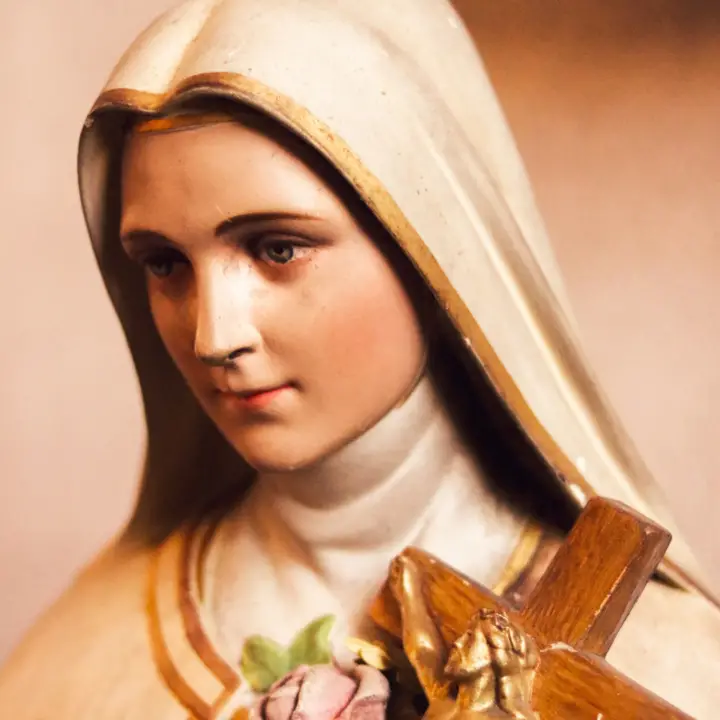Scrupulosity is a Religious or Moral Obsessive-Compulsive Disorder. A person with this type of OCD is excessively concerned about their actions that could be against the standards of their faith.
Desperate, one by one, I checked each content on google result after typing in the search bar, “I always go to confession”, “I confess the same sins again and again” and “I am too anxious if I sin or not”.
This was how I finally knew that my condition is called scrupulosity.
Unintentionally, I figured out that there were Catholic Saints who also experienced the scourge of this religious disorder.
I was relieved.
After feeling alone, I then, realized that it is not a battle to get lost in. I have now support, support from the saints I always admired.
I can now ask for their intercession, but this time, not for the help in my studies but for the fears to stop.
Even the Saints were not exempted from this religious mental suffering. Willingly, they bore it courageously and considered it a way to holiness.
Below are some of the Saints who in their lifetime experienced Scrupulosity.
St. Alphonsus Liguori (1696- 1787)
The founder of Congregation of the Most Holy Redeemer (CSsR), Bishop, Moral Theologian, and Doctor of the Church, St. Alphonsus experienced scrupulosity his entire life which also affected his health physically.
To combat it, he depended on his faith and relied on the Church’s teachings.
He had a great devotion to the Most Blessed Sacrament. He also obeyed the advice of his spiritual director whenever he felt he offended God.
Despite having the disorder, St. Alphonsus expressed in his writing how he views scruples as a blessing.
To administer those who are tormented by Scrupulosity (Religious Obsessive-Compulsive Disorder), Redemptorists publish Scrupulous Anonymous Newsletter which is a free monthly online subscription.
In addition, the Congregation also came up with a guide to beat the doubting disease.
Check here the 10 Commandments for the Scrupulous by Fr. Thomas S. Santa, CSsr.
This has been my go-to blueprint if I have doubts about my possible scrupulous actions.
Drastically, it helps me correct my thinking and develop a strategy to stop obsessions and compulsions.
RELATED– Prayer Journal for Scrupulous
St. Ignatius of Loyola (1491-1556)
This saint is well renowned for his amazing works for the Catholic Church. He founded the largest catholic religious order- Jesuits (Society of Jesus)- the vanguard of the counter-reformation. He also is famous for his spiritual exercises composed of prayers and meditations which are still in use to date.
As normal scrupulous individuals do, St. Ignatius’ scrupulosity manifested on the Sacrament of Penance.
He was just not satisfied with his confession. He kept on repenting for venial sins over and over again, believing that he might be committing a mortal sin whenever he had indecent thoughts.
In his book, Spiritual Exercises, St. Ignatius provided a section for Notes Concerning Scruples.
Here, the saint explained that people have an innate inclination to be lax or scrupulous in faith.
The solution to being in these cases is to deviate from what the enemy suggests. If you are scrupulous, establish your soul into moderation.
The sufferers are encouraged to do what causes them to doubt as long as it is not condemned by the Church.
St. Therese of Lisieux (1873-1897)
Born Marie-Françoise-Thérèse Martin in France, Therese was the youngest of nine children.
At the age of 15, she entered religious life as a Discalced Carmelite nun at Lisieux.
St. Therese of Lisieux also known as The Little Flower of Jesus is known for her simplicity. She is one of the most influential saints in the Catholic Church.
In 1997, Pope John Paul II gave her the “Doctor of the Church” status.
She is the patron saint of foreign missions, priests, florists, and the sick.
Even before her admission to the convent, St. Therese already experienced scrupulosity.
Just like other scrupulous, she was excessively afraid of displeasing God.
She would fret in everything she would do, excessively bothered that she might offend God, to the point that she feared that even her thoughts could lead to perdition.
Despite her scruples, she managed to live with complete trust in God’s mercy.
She constantly fought against the disorder considering it a temptation (based on the letter to her sister, Marie Guérin), thus the will to resist it.
St. Faustina Kowalska (1905-1938)
Maria Faustina Kowalska was a Polish Catholic nun who is also known as a secretary and apostle of mercy as Jesus visited her presenting Himself as the King of Divine Mercy.
Jesus instructed that He wanted the Divine Mercy Image to be blessed on the Sunday after Easter concluding the Octave of Easter.
Divine Mercy is highly regarded as one of the most renowned devotions for the Catholics up until today.
Ironically, St. Faustina also experienced scruples.
In her diary, she wrote that in her novitiate days, she felt her prayer offended God, even more so when receiving the Holy Sacraments.
Despite all these, she continued to accept God in the Holy Communion with the help of the Directress who encouraged her to do so.
In addition, Jesus appeared to her telling her to not omit Communion unless she was sure of her serious faults.
There was also a record that once, after preparing for confession, she only confessed two sins which were less compared to what she was about to reveal.
God did not allow her to tell the other because these were not sins in His eyes.
It was in her obedience that she finally recovered from scrupulosity.
Conclusion
For us scrupulous individuals, we tend to judge our shortcomings and failures as if we are not worthy to receive forgiveness from our Lord.
We view ourselves as someone who cannot be redeemed anymore but this is far from reality.
Three things Scrupulous Saints are teaching us are:
First, to continuously trust in the immense mercy of the Lord.
To just give our frailties, doubts, and fears before Him, at the foot of the cross.
Once we do, gradually, this will be the start of a strong relationship with Him.
A relationship that is rooted in trust, unshakeable, and can withstand the test of time.
Secondly, we need to follow the advice of our Spiritual Directors.
They are our guide and without them, we might go astray.
Having a person who could walk with you will make things lighter. Someone who would inspire and teach you how to act without the constant fear of hurting God.
They are what every scrupulous needs in the journey to recovery.
If you have no Spiritual Director yet, you can check this guide.
Lastly, we should depend on God and not on ourselves.
Scrupulosity blinds us to relying on ourselves more than on our Creator.
It pushes us to pride, deceiving us that we know what God knows. That He judges based on our judgment.
Just like what St. Therese wrote in the letter. It is a form of temptation and we need to defy it. We should ignore it.
I know it is not an overnight process, but these holy individuals remind us that we can manage scrupulosity. We just need to be patient.
In times we are down because of confusion and anxiety, let us remember that Saints were fully human too.
They experienced what we are experiencing now. They struggled as we are struggling, making them role models in defeating this scrupulosity. Since they are now closer to God, we can always lean on them, one prayer at a time.
For the best resources on scrupulosity, check this out.


Patricia Johnson
Dear Sirs:
I have just found your website and was grateful to see this site available to people with scruples. If you have any other resources, etc. I would appreciate seeing them. (pamphlets, books, organizations that deal with this problem). I used to receive monthly pamphlets from Scrupulous Anonymous but I don’t know if it still exists. I have been moving around the country frequently so that might be the reason. Thank you for all the work you do.
Sincerely, Patricia Johnson, age 80. Have been suffering with this since I was 18 years old, and I am so tired. Covid has created the worst scenario for my doubts and fears.
nicoleandrewmata
Hi Ms. Patricia,
Thank you so much for your kind words. I am sorry to hear that you are battling with this since you were 18 years old. I started this blog last December 2020 to help people with their scrupulosity. I, myself have it so I know how it feels. I am actively posting content on this website. And plan to improve it more.
May I ask if you already have a spiritual director? If none yet, you can check this:
https://scrupulouscatholic.com/2021/02/01/spiritual-direction-for-scrupulous/.
It is the no.1 advice I got when I first figured out I have religious OCD. But if you can control your scruples with other resources, you can check my post here about the best resources for scrupulosity:
https://scrupulouscatholic.com/2021/08/06/best-resources-for-scrupulosity/
I am currently improving my site by collecting emails and update my subscribers on all things about scrupulosity. Hope you get in touch by subscribing.
If you have further questions, you can hit me an email at this email address: nicoleandrewmata@gmail.com and if it’s okay, I’ll add you as my subscriber.
Thank you so much and stay safe!
In Christ,
Nicx